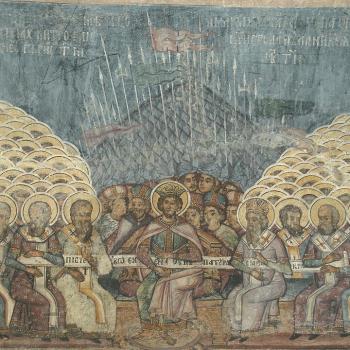South Korea is an embattled nation. Birthed out of brutal Japanese rule from 1910 to 1945 and then invaded by a Marxist army in 1950, it since has been threatened by North Korea, its totalitarian, atheistic, saber-rattling neighbor to the north. The understandable result has been a militarized nation that requires mandatory service for all men between the ages of 18 and 35.
According to Mennonite InterVarsity worker SeongHan Kim, this militarization has resulted in an intensely nationalistic Korean Christianity. Historian Timothy Lee writes, “South Korean evangelicalism coalesced with the collective interests of the larger society: first with Korean nationalism and then with South Korean anticommunism.” Churches often conflate the purposes of God with the purposes of the nation.

It is out of this unlikely context that Sang-Min Lee has come to a very different conclusion on whether Christians should kill other people on behalf of the state. As a student at a Christian college in Korea, Lee happened upon an article that “talked about how God so loved the world. But then I asked myself, ‘How can we care for each other in the name of God?’ . . . I began to ask myself, ‘Can I kill someone?’” In an interview Lee explained, “Right before Jesus was arrested by soldiers, Peter tried to protect Jesus and cut off a soldier’s ear with a sword. Jesus told Peter he could have called the angels to protect him. However, he chose not to. As a Christian, this is the most powerful Scripture for me and the reason I believe in Jesus Christ.” He transferred his church membership to Grace and Peace Mennonite Church in Seoul.
The response to Lee’s new thinking was devastating. His parents “expressed anger and harsh words,” not an unexpected response given the strong bonds and patterns of parental authority that characterize family life in Korea. Fellow evangelicals likewise responded to his conscientious objection with zero support. The state, which requires military training and service in the reserves, sentenced Lee to 18 months in prison. He was escorted directly to prison from the trial.
Lee was recently released. While in prison he felt support from abroad, receiving letters from fellow conscientious objectors in Justapaz, Colombia (where COs face similar obstacles), Chile, the Netherlands, and the United States. But that support doesn’t help his prospects in Korea. He had studied education, but will never get work in South Korea as a teacher because of his new criminal record. He hopes to find a job as a mechanic in a bike shop in Seoul.
This is not just a Mennonite concern, as the New York Times reported in October. Over the last few decades, Jehovah’s Witnesses have been vilified as “commies,” beaten, tortured, and killed in military camps and stockades. Techniques of torture included starvation, water torture, and microscopic cells where they were forced to stand for days without sleep. The 1970s and 1980s were especially bad, but even today the numbers are high—around 660 are jailed each year in South Korea—and conscientious objectors face public humiliation and the loss of employment and professional security. According to the United Nations’ Human Rights council, South Korea is responsible for 92.5% of imprisoned conscientious objectors worldwide. This is the same South Korea that the U.S. prizes as an important ally and that presumably stands as an Asian beacon of democracy.
Many readers of this blog may not agree with Lee’s hermeneutics. Certainly most South Korean Christians do not. The debate over conscientious objection, said Cho Myung-sik, 36, a veteran of the Korean military, is “a luxury we can’t afford as long as North Korea is there.” But if the Christian church in Korea, one of the strongest in Asia, wishes to fully reckon with the teachings of Jesus, it is a debate they must afford, even if it weakens their secular state.
A principled pacifism grounded in Jesus’s Sermon on the Mount and Paul’s writings in Romans is a long-standing theological tradition within Christianity. Before Constantine the vast majority of early Christians refused to kill for the state. As Wheaton theologian George Kalantzis writes, “With remarkably univocity they speak of participation in the Christian mysteries as antithetical to killing, and the practices of the army.” Since then some of the most respected Christian thinkers in history—including Tertullian, Leo Tolstoy, Charles Spurgeon, Martin Luther King, Jr., and John Howard Yoder—hold a similar position. More recently, evangelical thinkers such as Stanley Hauerwas, Scot McKnight, Greg Boyd, and Ben Witherington also echo this position. It is a conclusion based in conscience, not cowardice. It should be honored if not agreed with.
Please join me in calling for the government of South Korea to offer nonviolent alternatives for civil service—and in calling for Korean Christians to honor the conscience of Sang-Min Lee.












